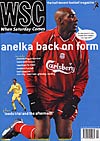 Steve Parish remembers Manchester City’s 1967-68 season
Steve Parish remembers Manchester City’s 1967-68 season
Nineteen sixty-eight was my last year at school. A-level revision had to be fitted in around the end to Manchester City’s best postwar season, when they played ten matches in six weeks. The run-in began with an amazing night at Old Trafford when George Best scored first but City cruised into top gear and beat title rivals United 3-1. I’ve still got the little reel-to-reel tape, recorded off the radio, of a Radio 4 documentary called More Than A Game, with vox pop interviews before, during and after the match, and roars, singing and cheers throughout.
Of course, being City, we lost the next match at Leicester but won three of the last four, leaving us top, with the Red Menace behind on goal average (goals for divided by goals against), the method then used to separate teams level on points, which favoured more defensive sides. In the last match, United were at home to Sunderland, we were away to Newcastle.
I went by coach, me and a few thousand others. In fact, it may have been the best ever City away crowd, as participating teams at the FA Cup final in those days were restricted to about 17,000 tickets. As well as the coaches and trains, clapped-out vans were pressed into service, and we passed one bloke in a blue scarf and a leg in plaster thumbing a lift on the A1 with his crutch.
It was pre-segregation, so when City scored blue and white erupted all round St James’ Park. And black and white when the Magpies equalised. City went 2-1 up only to concede another equaliser. But two more goals gave us a cushion, and a late goal by Newcastle only made it look like what we would now recognise as a typically Cityesque finish. And there were no instant messages to know that back in Manchester, Sunderland were winning. As the final whistle blew, we were on the pitch, digging at the grass. I kept a bit of that turf for weeks in a pot.
But there was one other match earlier that season that sticks in everyone’s memory. In December 1967, on a frozen pitch with a light covering of snow, a game that now would not be played is remembered still as “The Ballet on Ice”. Jimmy Greaves scored an early goal for Spurs, but then City began playing the most amazing football, when just staying on your feet seemed to require a miracle. Moves that might have looked laboured on a normal pitch took on a sort of Arctic grace, and a game free from the clogging tackles that passed for normal in those days developed its own momentum. City won 4-1, and it was the Match of the Day (when there was only one). Kenneth Wolstenholme – in his second most famous phrase – said: “I think we’ve seen the new champions.”
Joe Mercer and coach Malcolm Allison had transformed City’s fortunes from Second Division mediocrity, but Allison’s boast that “we’ll terrify Europe” (with an all-English team) foundered in the first round at Fenerbahce. At home, League success was not sustained, though we had a string of cup victories, including the 1970 Cup-Winners‚ Cup, won on a soggy Wed- nesday in Vienna. No one noticed in England, as the Cup final replay was on TV. We might have won the League in 1972 but for the purchase of Rodney Marsh – some believe his flamboyance wrecked the team’s cohesion. Joe Mercer left, Allison soon after, and despite another close run thing under Tony Book in 1977, there was no way to recreate the mood of 1968.
There may be some alive who think the 1937 title-winning team, which scored 107 goals, was better – but as they went down in 1938 you could argue convincingly against it. If you’re a young Blue, you can argue whether the play-off final at Wembley in 1999 or Blackburn 2000 was more exciting, but for those of a certain age, that team of Mercer and Allison that gelled in the ice and won the League remains the class act to match.
From WSC 180 February 2002. What was happening this month